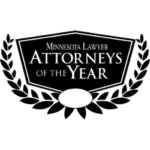St. Paul Brain Injury Lawyer
Did you or a loved one suffer a brain injury in St. Paul? The award-winning St. Paul brain injury lawyers at Milavetz Injury Law, P.A. can help fight for the compensation you and your family deserves.

Home » St. Paul Personal Injury Lawyer » St. Paul Brain Injury Lawyer
A traumatic brain injury can cause substantial disruptions to your daily life. You may find regular tasks and communication more challenging, from your personal life and close relationships to your professional life and chosen career.
A traumatic brain injury can cause various negative symptoms and side effects. If another party is responsible for your brain injury, you deserve justice for your damages and the hardships associated with your injury. The Milavetz Law personal injury lawyers in St. Paul can help victims of negligence recover losses. They have helped victims like you win compensation for their injuries. These damage awards can help you receive the necessary treatment you need to recover.
What is a traumatic brain injury?
A traumatic brain injury (TBI) occurs when trauma to the head injures the brain. Some TBIs are obvious. For example, medical professionals would immediately suspect a TBI when someone experiences a fractured skull or a head injury resulting in a coma or extended loss of consciousness. However, not all traumatic brain injuries are as recognizable.
Some common causes of TBI include:
- Car accidents
- Motorcycle accidents
- Truck accidents
- Slip and fall accidents
- Medical negligence
- Sports accidents
- Assault
The Difference Between TBIs and Concussions
A concussion is technically a traumatic brain injury, although it is less severe than most TBIs. Still, concussions can result in long-term symptoms that drastically affect your quality of life.
If you suffer from a concussion in the St. Paul area, you may be entitled to receive damages for your injuries. A St. Paul traumatic brain injury lawyer can answer your questions and determine your legal options.
Persistent Post-Concussion Symptoms
Persistent post-concussion symptoms, sometimes called post-concussion syndrome, are symptoms that last longer than expected. The usual recovery period is weeks to months, but some cases may last longer. The following symptoms are associated with post-concussion syndrome:
- Memory problems
- Concentration problems
- Dizziness
- Headaches
Usually, symptoms appear within the first 10 days and disappear within three months, but in these cases, they can last for over a year.
When To See a St. Paul Brain Injury Lawyer
If you unjustly received your TBI and are stuck paying the medical bills or watching your quality of life slip away, you are likely angry about your situation. The good news is that you may be eligible to receive damages for your injuries. It is unfair for you to live with a TBI if the injury resulted from someone else’s negligent actions.
Regardless of whether you sustained your TBI from a car accident or another negligent act, a St. Paul brain injury lawyer may be able to help you recover financial losses.
The Types of TBI Doctors See in St. Paul
There are three different grades of TBIs that doctors frequently see in St. Paul, ranging from mild to severe. Various factors, including specific neurological symptoms, loss of consciousness, loss of memory, or abnormalities on a CT scan or MRI, determine the severity of your TBI.
- Severe TBI results in a loss of consciousness for more than 24 hours.
- Moderate TBI leads to a loss of consciousness for more than 30 minutes but less than 24 hours.
- Mild concussion (mTBI) is the most common type of traumatic brain injury, making up about 75 percent of annual TBIs, resulting in loss of consciousness for less than 30 minutes and, potentially, confusion for a day.
In addition to these grades, there are other terms and classifications used to describe the type of concussion you may be experiencing:
- Nontraumatic TBI: These injuries are sometimes called anoxic or hypoxic brain injuries. Sometimes a TBI isn’t the result of trauma but due to a seizure, stroke, or near-drowning. When the brain is deprived of oxygen for too long, it can result in this type of brain injury.
- Complicated TBI: In these cases, the CT or MRI reveals undesirable changes, such as bleeding.
- Uncomplicated TBI: Scans reveal normal results in these injuries, regardless of the TBI’s severity.
- Open TBI: A penetrating TBI may sometimes be called “open.” These injuries occur when something penetrates the skull. The object can destroy the surrounding tissue if it manages to enter the brain.
- Closed TBI: Most TBIs are closed, meaning no objects penetrated the skull. A closed TBI results from an outside force causing a blow to the head without penetrating the skull, but it still injures the brain.
Potential Consequences of TBIs
A traumatic brain injury can severely disrupt your quality of life. It can negatively impact your ability to work, drive, engage in favorite activities and hobbies, and even disrupt your most cherished relationships. Some TBIs are mild, and their symptoms may gradually fade. However, some are severe and result in long-term or permanent damage and lifelong rehabilitation.
The potential effects of a TBI can include the following:
Cognitive effects:
- Memory problems and amnesia
- Loss of sense of time and space
- Inability to understand more than one or two-step instructions
- Difficulties with judgment
- Loss of problem-solving skills
Motor effects:
- Issues swallowing
- Tremors
- Decreased endurance
- Paralysis or weakness
- Inability to plan physical movements
Perceptual and sensory effects:
- Right or left-sided neglect
- Changes in vision, hearing, smell, taste, and touch
- Vision problems, such as limited vision, lack of visual acuity, and double vision
- Misunderstanding where limbs are compared to the body
- Heightened or loss of sensation of body parts
Communication and language effects:
- Problems writing, reading, and working with numbers
- Decreased vocabulary and slow, hesitant speech
- Difficulty understanding speech, speaking, and choosing the right words (aphasia)
- Forgetting how to perform common activities (apraxia)
- Difficulty identifying objects and their purpose
Functional effects:
- Inability to operate machinery or drive a car
- Issues with organizational duties such as paying bills or shopping
- Difficulty performing daily living activities, such as showering, eating, and dressing
Social effects:
- Issues with making or keeping friends
- Challenges with social interactions
- Difficulty with understanding the finer details of social interactions or responding appropriately
Regulatory effects:
- Headache
- Dizziness
- Fatigue
- Sleep and eating pattern disruptions
- Bladder and bowel control disruptions
Personality or psychiatric effects:
- Anxiety or depression
- Apathy
- Irritability
- Decreased motivation
- Disinhibition, such as aggression, cursing, and inappropriate sexual behavior
What is a TBI case worth?
Even a mild TBI can significantly disrupt your daily life. Your ability to recover monetary damages related to your traumatic brain injury depends on several things:
- Was another party responsible for the accident that caused your TBI?
- Were you also somewhat responsible for the accident?
- Have you suffered damages from the injury?
Negligence of the Other Party
If the other party acted negligently and their actions resulted in the accident that caused your TBI, you or your lawyer must be able to prove negligence.
For example, suppose a drunk driver caused a motorcycle accident that resulted in your TBI. In that case, the police should have records that can help you prove negligence in court — driving while impaired is negligent behavior. If witnesses saw the drunk driver driving erratically before hitting you, that can also help your case.
An experienced St. Paul brain injury lawyer can assess how difficult it will be to prove negligence in your case.
Contributory Negligence
The St. Paul courts follow the rule of contributory negligence. Even if you were negligent and shared some responsibility for your accident, you can still recover monetary damages if you were not primarily responsible. If the court finds you 10 percent liable in a $100,000 claim, you would lose 10 percent of the reward and claim $90,000.
Your Damages
You must be able to prove that the negligent party caused damages. If you suffered a TBI due to their actions, then damages should be relatively straightforward. You likely have incurred costs from medical bills, rehabilitation, and lost wages. Depending on the severity of your TBI, you may have a claim for lost future wages and medical bills.
Depending on your case, you may be able to claim additional non-economic damages, such as emotional distress, pain and suffering, and loss of enjoyment of life. These damages can add up quickly to surprising amounts.
Why Choose Milavetz Law, P.A.?
At Milavetz Law, P.A., our goal is to protect your individual freedoms and give you a voice. Since 1963, we have helped many people who have been injured by reckless and negligent parties.
Our St. Paul brain injury lawyers are ready to help. We can obtain the monetary damages you need and deserve, so you can receive the necessary support to recover from your TBI.
Contact us today to arrange your free consultation.
Discuss Your Legal Questions With A Member Of Our Team
"*" indicates required fields




Speak to an Attorney Today
Let Us Help You With Your Financial Help & Compensation Options


